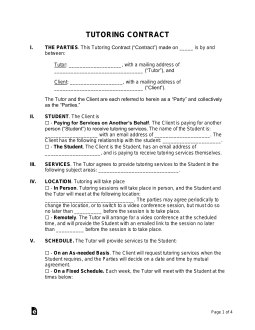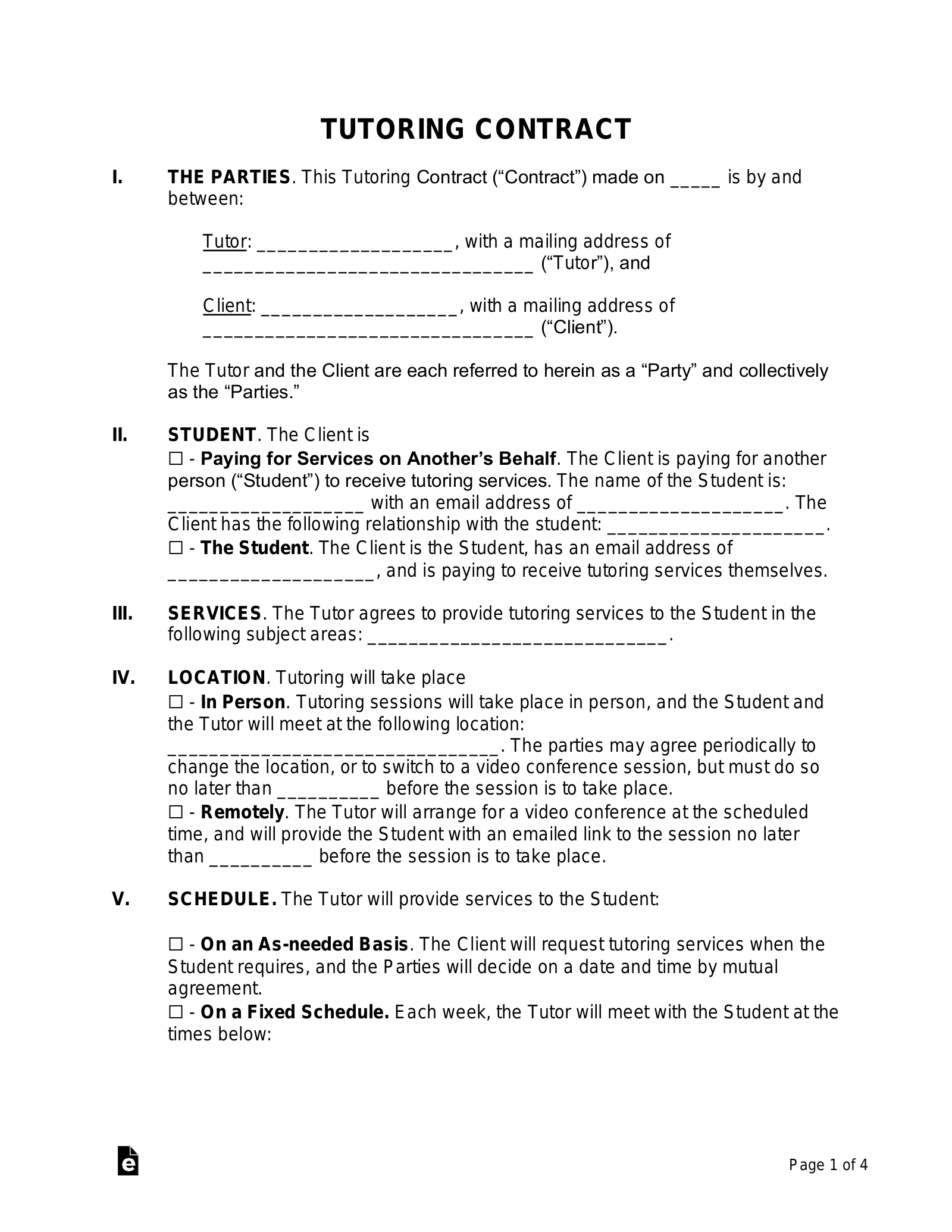Updated June 05, 2023
A tutoring contract contains the terms of an agreement for providing tutoring services. Tutoring contracts are valuable because they formalize the responsibilities of the tutor and the client and clarify common issues that come up in tutoring, such as cancellations. Tutors may operate on their own, or be matched with clients through a tutoring agency; either way, they typically work as independent contractors.
Table of Contents |
What’s Included?
While the specifics of any tutoring contract will depend on the needs of the student and the kind of tutoring being offered, there are some sections that almost all agreements should include.
The Client
Unlike most independent contractor situations, in a tutoring contract, the person receiving the service is typically not the person paying for the service. This is because most, though not all, people who receive tutoring are minors.
As a result, tutoring contracts generally distinguish between the “client,” who is the person paying for the tutoring service and signing the tutoring contract, and the “student,” who is the person that will receive tutoring. The most common situation is when a parent is the client in an agreement to provide tutoring to their child, the student.
Schedule and Duration
Many clients find it beneficial to establish a set schedule for the student, and tutoring contracts often include a place to identify days and times when tutoring will take place. The tutor and the client can decide when sessions will take place and how long each session will last.
The length of each session will depend on client expectations, tutor availability, and the age of the student. Academic studies of tutoring’s effectiveness have found that tutoring is most beneficial when:
- Consistency: The student works with the same tutor.
- Sessions: The student has multiple sessions per week
- Length: Sessions are long enough to cover needed material, but not so long that the student’s attention span begins to decline.
Cancellation Policy
Having a clear cancellation policy is one of the most valuable features of a tutoring contract. While the parties are free to decide how much notice a client must provide in order to cancel a session without being charged, 24 hours is a standard measure.
Clients commonly seek tutoring for the remainder of a school year, but can also seek tutoring for shorter time periods, like the time needed to complete an essay or project. Fixed schedule contracts can also explain how the parties can change or modify the schedule, and clarify what happens if a session coincides with a holiday.
Tutoring Session Fees
Most tutors charge an hourly rate, rather than a per-session rate, because it allows them to offer sessions of different lengths. As an alternative, some tutors may sell “packages” of multiple sessions, with a cheaper per-session rate for larger packages to encourage clients to purchase more sessions.
- Median nationwide tutoring rate: $20/hr (Source: BLS)
The rate can also vary depending on what is being taught: Tutors with experience in challenging or obscure subjects, or those with specialties like standardized test preparation can command considerably more.
Expectations
It is extremely uncommon for tutoring agreements to be contingent on a student’s grades improving. If a client wants such a provision, they should make this clear during negotiations, and will likely have to pay a higher rate in exchange.
However, both the student and the tutor do have obligations under a contract. The tutor needs to be knowledgeable about the subject or subjects being covered, while the student needs to arrive prepared to take advantage of the scheduled session.
Tutor
The tutoring contract should contain a recitation of what subjects the tutor is responsible for covering with the student. As an independent contractor, the tutor has control over what tutoring methods will be used, but the agreement can reinforce that the tutor is able to provide at least an industry-standard level of tutoring in that subject.
Clients will likely have some sense of what a tutor will provide even before entering the agreement. Nonetheless, including a section on the expectations or obligations of the tutor is important. Students’ needs may change over the course of the agreement, and the contract can help prevent a tutor from being responsible for subjects in which they lack expertise.
Student
Before the first session, tutors should make clear to the client what the student is expected to do in preparation for each session. This typically includes knowing what assignments or test are approaching and the resources necessary to study or complete them, including books or materials like a compass for certain math problems.
Parents of students in tutoring should keep in mind that the classroom is becoming increasingly digitized, and that many assignments may require making use of educational software or applications like Canvas. The client and the tutor should ensure that the tutor, the student, or both, is able to use the necessary technology.
Remote vs. In-Person
- Physical presence: In-person tutoring allows the tutor to be physically present with the student, which can facilitate better communication and understanding. Virtual tutoring, on the other hand, relies on technology, which may cause delays or interruptions in communication.
- Flexibility: Virtual tutoring offers more flexibility in terms of scheduling and location. Students and tutors can connect from anywhere in the world, which can be especially helpful for students who live in rural areas or have busy schedules. In-person tutoring requires both parties to be in the same physical location, which can be a limitation.
- Interactivity: In-person tutoring may be more interactive as the tutor can use physical materials and activities to engage the student. Virtual tutoring requires the tutor to be more creative in their teaching methods to keep the student engaged.
- Technology: Virtual tutoring requires both the student and tutor to have access to a reliable internet connection and a device that supports video conferencing. In-person tutoring does not require any technology other than physical materials like books and paper.
- Comfort: In-person tutoring may offer a more comfortable environment for students who prefer face-to-face interaction. Virtual tutoring may be more comfortable for students who feel more at ease communicating online.
Do You Need a License to Be a Tutor?
There are no state licensing exams for tutors. There are also no general requirements about the level of education required to be a tutor. Clients who desire a tutor with a particular degree or certificate should inquire about a tutor’s background.
Many tutors, however, are either former teachers, or current teachers trying to make additional money. These tutors will generally be able to command higher rates. Additionally, some types of tutoring, particularly working with young students and teaching reading, require an understanding of pedagogy (the “science” of teaching) rather than a particular subject and are generally reserved for those with more training.
Sample
TUTORING CONTRACT
I. THE PARTIES. This Tutoring Contract (“Agreement”) dated [DATE] (“Effective Date”), is between the following:
Client: [CLIENT’S NAME] with a mailing address of [ADDRESS] (“Client”) and
Tutor: [TUTORS’S NAME] with a mailing address of [ADDRESS] (“Tutor”)
Client and Tutor are each referred to herein as a “Party” and, collectively, as the “Parties,” agree to the following:
II. STUDENT. The Client is: (check one)
☐ – Paying for Services on Another’s Behalf. The Client is paying for another person (“Student”) to receive tutoring services. The name of the Student is: [STUDENT’S NAME] with an email address of [STUDENT’S EMAIL ADDRESS]. The Client has the following relationship with the student: [RELATIONSHIP TO STUDENT].
☐ – The Student. The Client is the Student, has an email address of [STUDENT’S EMAIL ADDRESS], and is paying to receive tutoring services themselves.
III. SERVICES. The Tutor agrees to provide tutoring services to the Student in the following subject areas: [LIST TUTORING SUBJECTS].
IV. LOCATION. Tutoring will take place
☐ – In Person. Tutoring sessions will take place in person, and the Student and the Tutor will meet at the following location: ADDRESS WHERE TUTORING WILL OCCUR].
☐ – Remotely. The Tutor will arrange for a video conference at the scheduled time, and will provide the Student with an emailed link to the session no later than [TIME FRAME] before the session is to take place.
IV. FEE. In exchange for providing tutoring services, the Client will pay the Tutor a rate of $[DOLLAR AMOUNT] per hour.
V. SCHEDULE. The Tutor will provide services to the Student: (check one)
☐ – On an As-needed Basis. The Client will request tutoring services when the required, and the Parties will decide on a date and time.
☐ – Schedule Sessions. On a Fixed Schedule. Each week, the Tutor will meet with the Student at the times below:
SUNDAY: ____:____ ☐ AM ☐ PM
MONDAY: ____:____ ☐ AM ☐ PM
TUESDAY: ____:____ ☐ AM ☐ PM
WEDNESDAY: ____:____ ☐ AM ☐ PM
THURSDAY: ____:____ ☐ AM ☐ PM
FRIDAY: ____:____ ☐ AM ☐ PM
SATURDAY: ____:____ ☐ AM ☐ PM
SUNDAY: ____:____ ☐ AM ☐ PM
VI. TERM. This Agreement will start with the 1st Session on [DATE] and continue for a(n): (check one)
☐ – Ongoing Basis and continue until canceled by either Party with [#] days’ notice.
☐ – Fixed Period and continue until [END DATE] (“End Date”). Prior to the End Date, either Party can cancel this Agreement with [#] days’ notice without incurring a penalty.
VII. LATE POLICY. If the Student is late to a scheduled session by more than [#] minutes, the session will be considered forfeited, and the Tutor is under no obligation to remain at the tutoring location, or to remain online for remote sessions. If the Tutor is late to a session, If the Tutor arrives late to a scheduled session, the Client may choose to add the missed time to a future session at no additional cost, receive a partial refund, or receive a partial credit toward a future session..
VIII. CANCELLATION POLICY. If the Client wishes to cancel a scheduled tutoring session, the Client must provide the tutor with at least [#] hours’ prior notice. If the Client does not provide the required notice, the Client will be charged for the session whether or not the Student is present.
IX. SERVICES. The Tutor is responsible for providing tutoring services in the following subjects: [LIST SUBJECTS]
X. NO WARRANTY. The Tutor makes no guarantees that tutoring services will result in any improvement in the Student’s grades or exam scores. The Tutor will make a good faith effort in accordance with industry standards.
XI. GOVERNING LAW. This Agreement is governed under the laws located in the state of [STATE].
XII. ADDITIONAL TERMS & CONDITIONS. [DESCRIBE]
Client Signature: ___________________________ Date: _______________
Print Name: ___________________________
Tutor Signature: ___________________________ Date: _______________
Print Name: ______________________
Tutoring Resources
There are ample resources available online to supplement a tutor’s own resources. Some of the best include:
- Desmos: Free graphing software for mathematical functions; can be used for students in late elementary school up to those in advanced math
- Khan Academy: A nonprofit website that offers a curriculum in several subjects; particularly good for math and science
- Quizlet: A free online service to create tests and flashcard sets; good for social science and humanities subjects
- Conjuguemos: A platform for game-based learning of eight different languages


